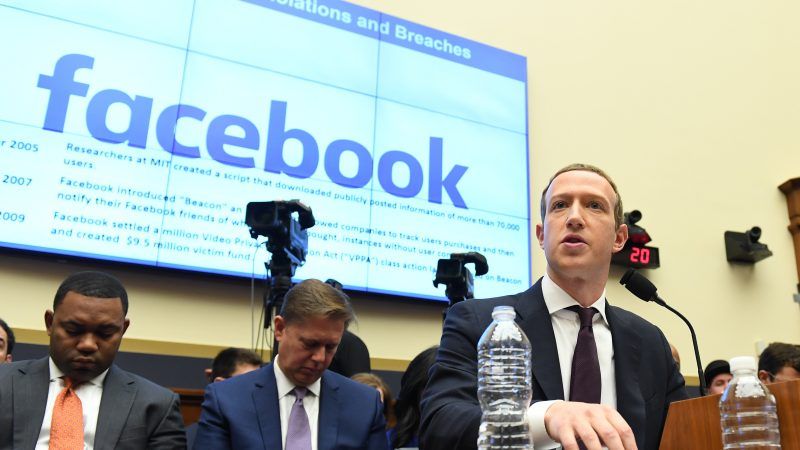In Debate Over Political Speech Online, Facebook Has the Constitution on Its Side
As surely as winter follows fall, Republican election victories are followed by unconstitutional attempts to restrict political speech.

As surely as winter follows fall, Republican election victories are followed by unconstitutional attempts to restrict political speech.
The Nixon presidency brought the Federal Election Campaign Act of 1971, which the Supreme Court partially struck down in Buckley v. Valeo. The George W. Bush presidency brought the Bipartisan Campaign Reform Act of 2002, also known as McCain-Feingold, after the senators who sponsored it. The Supreme Court partially struck down McCain-Feingold in a series of decisions, including McConnnell v. FEC, FEC v. Wisconsin Right to Life, and Citizens United.
And the Trump presidency seems to be on the verge of bringing us some kind of federal government crackdown on political speech on social media.
As usual in Washington, there is plenty of blame to go around.
Some of the blame belongs to the Republicans. They vote for these bills and sign them into law even after swearing or affirming to preserve, protect, and defend a Constitution that includes the First Amendment freedoms of speech, press, and petition.
And some of the blame belongs to the Democrats. They have such a constricted view of the boundaries of reasonable discourse and are so confident in the popularity of their own views that whenever their side loses an election, they immediately conclude that the rules need to be changed to prevent whatever vote-buying or disinformation must have caused the otherwise inexplicable outcome.
This, then, is the context in which to view the attempt by members of Congress, Democratic presidential candidates, and even the screenwriter Aaron Sorkin to portray advertising on Facebook as an unprecedented threat to American democracy, and to saddle the Facebook CEO, Mark Zuckerberg, with the responsibility of making sure that no American is swayed by a false political advertisement.
The hypocrisy is overwhelming. Between May 2018 and November 1, 2019, Senator Elizabeth Warren's presidential campaign has spent $4,862,939 on Facebook ads, according to Facebook. This, while Warren complains publicly that "Facebook's own employees know just how dangerous their policy allowing politicians to lie in political ads will be for our democracy." If Facebook had followed Twitter's example and banned political ads, Warren would have had to find some other way to get her message out.
More broadly, the way to deal with misleading political speech is not with prior restraint but by answering it with more accurate speech. That approach respects voters as smart enough to sort these things out, rather than infantilizing them as easily deceived.
In The New York Times over the weekend, a professor at the University of Virginia, Siva Vaidyanathan, called on Congress to outlaw the delivery of targeted advertising. "If the same political ads were to reach everyone in a state, district or even country, they would not just appeal to marginal constituencies, might not tend toward extremism, and could not get away with lies quite so easily," the professor imagines.
But politicians have been advertising with tailored messages to "marginal constituencies" since long before Facebook. They use robo-calls to reach identified union members. They use direct mail to reach public-school parents, or Democratic women within a certain age range, or senior citizens. The Bill Clinton presidential campaign aired radio ads on Christian radio stations in 1996 touting that Clinton had signed the Defense of Marriage Act, which defined marriage as between a man and a woman. Our two-party system and winner-take-all electoral process already serve to erode, rather than magnify, the power of "marginal constituencies." And anyway, sometimes something that starts as a "marginal constituency" or seems extreme—abolition, women's suffrage, Zionism, fill in your own favorite idea here—becomes a mainstream cause. The First Amendment guarantee of political speech is supposed to apply equally, regardless of whether some professor deems your cause marginal or extreme.
One of the landmark press freedom cases of the 20th century, New York Times Co. v. Sullivan, concerned a paid advertisement by civil rights activists in the 1960s that, as the syllabus of the case puts it, "included statements, some of which were false." Should desegregation activists in the 1960s south have been prevented from targeting advertisements to sympathetic Northern liberals? Or should they have been forced to pay also for ads to segregationists, so that everyone saw the same ads? And should the ad have been rejected because of the false claims?
The justices in Times v. Sullivan found that "erroneous statement is inevitable in free debate, and that it must be protected if the freedoms of expression are to have the 'breathing space' that they 'need . . . to survive.'" The Court cited an earlier ruling, NAACP v. Button, observing "the constitutional protection does not turn upon 'the truth, popularity, or social utility of the ideas and beliefs which are offered.'" It is something that Senator Warren may want to review. It will be useful if she returns to her career as a law professor, but also if she advances to the office sworn to defend the Constitution.
